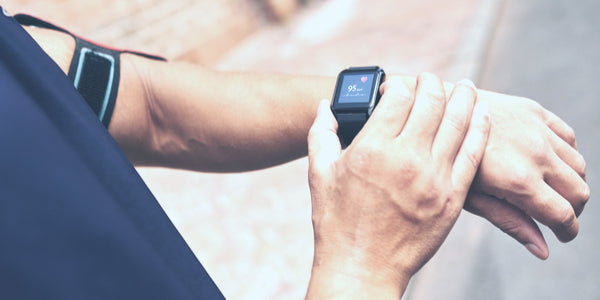
When utilized appropriately, health gadgets can be extraordinary tools that provide insight into the inner workings of the body and allow one to track and monitor progress.
Smartwatches and heart rate monitors are the most popular health monitoring devices, nowadays. But many home health monitors from gut health evaluations to blood glucose tracking and other monitoring technologies also exist.
Learn all about different health monitoring devices to make an informed choice about which one can benefit you best!
What Does a Smartwatch or Activity Tracker Do?
Although each specific activity tracker boasts different features, they all aim to fundamentally measure motion. They collect the data of motion in a variety of ways from accelerometers to gyroscopes and then provide output data, usually on a smartphone or an application. In turn, a person can then make more informed decisions about their health and monitor progression over time.
Oftentimes, activity trackers require baseline health information input like height, weight, gender, and age. This then helps the activity tracker analyze the data it collects through the motion sensors. Furthermore, activity trackers often use personalized algorithms within their software in order to implicate the data into more individualized information and/or recommendations.
Activity trackers can also intentionally or unintentionally encourage users to improve their health. Whether through alert and goal reminders via the app or the reinforcement of seeing how much of a goal is already met, they can certainly serve as inspiration. Being able to closely and chronologically monitor fitness and health progress through seeable data makes it a more tangible aspiration and thus, increases motivation to continue progressing.
Useful Home Health Monitor Options
From smartphone trackers to brain-sensing headbands, home health monitor options are diverse. Find out more about these unique devices and if one might be beneficial.
Smartphone/Watch Fitness Trackers
Fitbit paved the way for activity and fitness trackers to flourish. Although not the first device to measure steps (remember pedometers?!), they were much more fashionable monitors that not only counted steps. They also provided info about distance traveled, floors climbed, calories burned, active minutes, heart rate, and sleep quality depending on the make and model.
Nowadays, the most advanced athletes utilize fitness trackers that can track heartbeat irregularities and measure blood oxygen saturation during sleep. In general, fitness trackers tend to benefit those seeking to monitor overall health and exercise performance patterns.
Brain Sensing Headband
Newer to the market, brain-sensing headbands utilize electroencephalography sensors (an EKG of the brain) to monitor brain activity during meditation. Just like an electrocardiogram, EEGs sense brain waves and then analyze the info in terms of anxiety and thinking patterns.
Designed to help manage stress, this tool provides feedback on what is occurring in the brain and can teach one how to achieve more peace and calmness.
As an incentive, some of them also offer motivational challenges and rewards to encourage regular meditation practice. This monitoring device would serve someone trying to ease their mind or decrease anxious stress.
Heart Health Monitor
Heart monitors are so common, many treadmills include one in their offer. These devices measure heart rate, defined by how fast the heart pumps blood per minute. This is useful for athletes trying to reach target or max heart rates.
However, heart health monitors have received an upgrade, and ones now exist that can provide whole EKGs to smartphones. Rather than a watch or band worn around the diaphragm, this type of heart monitor is a separate device that provides data to a smartphone application. One particular brand, AliveCor, utilizes finger preceptors to gauge heart rate.
While this device especially serves athletes, it can benefit anyone looking to stabilize their heart rate. Persons trying to determine stressful triggers can also benefit, as heart rate tends to rise with increased stress.
Blood Glucose Monitor
A savior for people with diabetes, blood glucose monitors use a variety of different methods to measure fasting and resting blood sugar levels throughout the day. For all type 1 and some type 2 diabetics, their blood glucose levels provide information as to how much insulin to give themselves before or after a meal.
For people without diabetes, glucose monitors can still provide helpful information because blood sugar stabilization is one of the most important indicators of good health. Blood sugar readings can provide insight into what foods raise blood sugar too high and which ones stabilize it best.
Not only do they reveal blood sugar levels, but they can also monitor average levels over time. Meaning, they can reveal patterns, like when sugar levels tend to rise and dip throughout the day and over months. Especially helpful for people wanting to lower their hemoglobin A1C values, glucose monitors serve anyone with endocrine abnormalities such as diabetes, PCOS, or thyroid dysfunction.
Sleep Monitoring Devices
As more research elucidates the monumental effect of sleep on health, sleep trackers are becoming more popular. Many smartphones and applications measure the quantity of sleep per night.
However, true sleep monitor devices measure the length along with details about each specific stage of sleep through parameters such as heart rate and body temperature. Therefore, the best sleep monitors are worn on a person's actual body.
Usually connected to a bluetooth device like a smartphone, these monitors can also evaluate data such as sleep noises (snoring), how deep someone slept, when someone likely dreamt, and more. These comprehensive reports can provide insight as to where someone might benefit from, including:
• Going to bed at a certain time based on their sleep cycles.
• When to take a quick nap during the day.
• When to seek help for a condition such as sleep apnea.
Sleep trackers can benefit everyone, because the average person tends to have poor sleep habits unaligned with their natural circadian rhythm.
Fertility Tracking Device
No longer are eager partners told they just simply cannot have kids thanks in large part to fertility trackers. Through these devices, women can measure and monitor a variety of reproductive and fertility measures to determine when they are or aren’t ovulating. Some track body temperature while others track cervical mucus to paint the picture.
Conversely, fertility tracking devices are helpful for women not looking to get pregnant, as they can recommend the five best days to try for a baby. In theory, not trying to conceive a baby on the other 25 to 26 days of the month would prevent an undesired pregnancy. Each of them will produce different effectiveness, so read directions and warnings carefully.
Fertility trackers will benefit women trying to get or avoid pregnancy most, but can also provide insightful info about menstrual cycles and reproductive health to all women.
What Do the Numbers Mean on Health Monitoring Devices?
Based on the specific tracking device, the numbers will mean something different. Some information like steps walked, distance traveled, or heart rate is pretty straightforward.
Although the actual data may be obvious, it is often meaningful. For example, a blood glucose monitor that reveals an average fasting blood glucose of 110 is really indicating pre or potentially active diabetes.
On the other hand, some devices like the brain sensing headband or EKG monitor may produce numbers and other data not so easily digested. Thankfully, the more complicated monitors tend to come with pamphlets or additional resources that elucidate what their analysis actually means. The brain-sensing headband, for instance, may measure theta waves which can offer information about what kind of thoughts provoke anxiety.
Based on the tracking devices discussed above, below details what each generally measures and what the output data means.
Smartphone
These tend to measure steps, distance, floors climbed, calories burned, heart rate, and active minutes. All of these measures provide insight into how physically active and fit someone is.
Brain Sensing Headband
This device measures brain signals through calibrated sensors. The data it provides reveals implications of brain activity for further contemplation and analysis.
Heart Monitor
This well-known device measures beats per minute, which literally reveals how many times the heart pumps per minute. Low values tend to imply a resting or diseased state like anorexia, while high rates imply a working state. Chronically high rates may suggest early stages of heart disease or high blood pressure.
Blood Sugar Monitor
Glucose meters measure how much sugar is circulating the blood while in a fasted or fed state. Fasting sugar levels can reveal how well the pancreas matches insulin output while fed levels offer information about how different foods or combinations of macronutrients (meals) affect blood sugar levels.
Sleep Monitor
The most basic of these devices provide information about length of sleep and sleep cycles. Depending on the data measured and provided, the numbers may mean how many minutes of deep versus restless sleep one obtained or when someone likely dreamt.
Advanced devices may also be able to give info about how to optimize one's circadian rhythm.
Fertility Tracking Devices
Because there are a variety of different ways to measure fertility, each device will provide unique values. Hormone measures reveal blood hormone levels in relation to menstrual cycles while temperature trackers reveal basal body temperature in relation to ovulation.
On the other hand, cervical mucus trackers provide qualitative versus quantitative information.
Importance of Diet While Monitoring Yourself
Like always, supplement a health monitoring device with a nutritionally adequate diet! Tracking the aforementioned measures of health is admirable, but diet is the foundation of overall health, dictated by the enteric system, or the small brain in the gut.
Focus on including a nutrient-dense, balanced diet with plenty of the following foods:
• Colorful fruits and veggies
• Whole grains like oats and brown rice
• Lean protein like fish and chicken breast
• Healthy fats like avocado and nuts/seeds
• Beans and legumes
Of course, there are calorie tracking applications as well such as MyFitnessPal and MyPlate Calorie Tracker among many others. Food trackers can measure calories, macronutrients, and specific nutrients like vitamin and mineral levels. However, using multiple tracking devices at once may provide conflicting information about target calorie and macro goals, so proceed with smart caution.
For anyone with a history of eating disorders or a compulsive or obsessive relationship with food, tracking may not be of interest as these are known to perpetuate poor outcomes within this population. Thus, this same population should also exert caution with other tracking devices and applications (especially step counters) to avoid straining a relationship with another facet of health.
The Bottom Line
Utilizing health monitoring devices and consuming a healthy diet in tandem can set one up for the most optimal state of health. They can also be helpful for tracking fitness goals, amongst other measures.
Still, tracking all of these measures of health is often unnecessary and targeted choices will provide more meaningful insight.
References:
How do wearable fitness trackers measure steps? News-medical.net. http://www.news-medical.net/health/How-do-wearable-fitness-trackers-measure-steps.aspx. Published November 30, 2016.
Meeroona. 18 portable health gadgets that can change your life. Travelaway.me. http://travelaway.me/portable-health-gadgets/. Published October 17, 2015.







